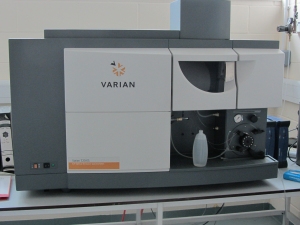ICP-AES Analysis (Inductively coupled plasma-atomic emission spectrometry) is a method that provides a rapid and precise means of monitoring up to 50 elements simultaneously for minor- and trace- levels.
 ICP-AES is an emission spectrophotometric technique, exploiting the fact that excited electrons emit energy at a given wavelength as they return to ground state. The plasma (ionized argon) produces temperatures close to 7,000°C, which thermally excites the outer-shell electrons of the elements in the sample. The fundamental characteristic of this process is that each element emits energy at specific wavelengths peculiar to its chemical character.
ICP-AES is an emission spectrophotometric technique, exploiting the fact that excited electrons emit energy at a given wavelength as they return to ground state. The plasma (ionized argon) produces temperatures close to 7,000°C, which thermally excites the outer-shell electrons of the elements in the sample. The fundamental characteristic of this process is that each element emits energy at specific wavelengths peculiar to its chemical character.
Although each element emits energy at multiple wavelengths, in the ICP-AES technique it is most common to select a single wavelength (or a very few) for a given element. The concentration of the elements found is calculated using the response of standard calibrating solutions that are run at the same time.
ICP-AES analysis requires a sample to be in solution. Solid samples are decomposed in a microwave digester or with hotplate methods using acid mixtures or by a flux-fusion technique. A wide range of different samples can be analysed (e.g. minerals, metals, rock, alloys, ceramics, refractories, glass, soil, water etc.)
The ICP-AES machine used at ITA Labs is a Varian 720-ES.
ITA Labs’ UK laboratory is experienced at providing trace elements analysis results, with a fast turnaround, at very competitive rates using a Varian 720-ES spectrometer.
Mark Dowling

+44 (0) 1727 871 316